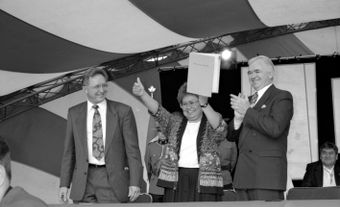History
The Cyprus Anvil Mines Co. built the town in 1969 to house employees of its open pit lead and zinc mine. Ravaged by a forest fire in its first year, it was quickly rebuilt and became the territory’s second-largest community. The mine was Canada’s largest producer of lead, and its exports became a mainstay of the Yukon economy in the 1970s. As a result of depressed lead and zinc prices, the mine shut down in 1982 and Faro was depopulated. Between the census years 1981 and 1986, three-quarters of the town’s population left. From its first closure until permanently closing in 1998, the mining operation went through a series of openings and closures and was sold twice.
Present-Day
Today, Faro's population has stabilized and its residents are employed in government services and commerce. Its name is derived from a game of chance popular in Klondike saloons, in which the cards bore a stylized portrait of an Egyptian pharaoh.

 Share on Facebook
Share on Facebook Share on X
Share on X Share by Email
Share by Email Share on Google Classroom
Share on Google Classroom

